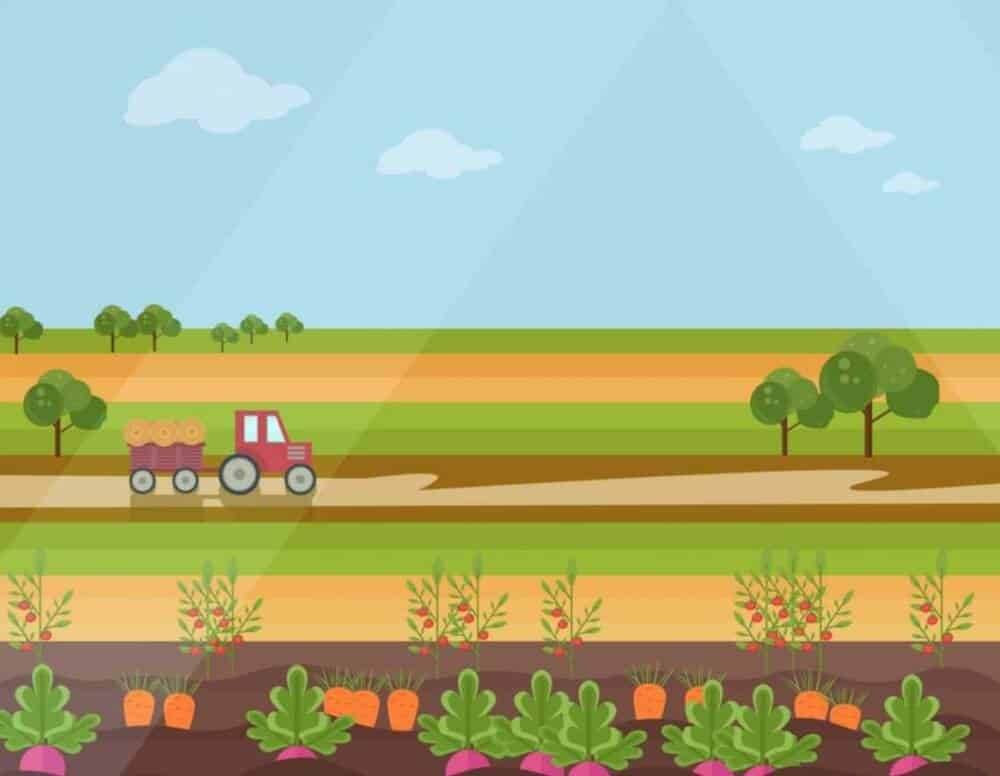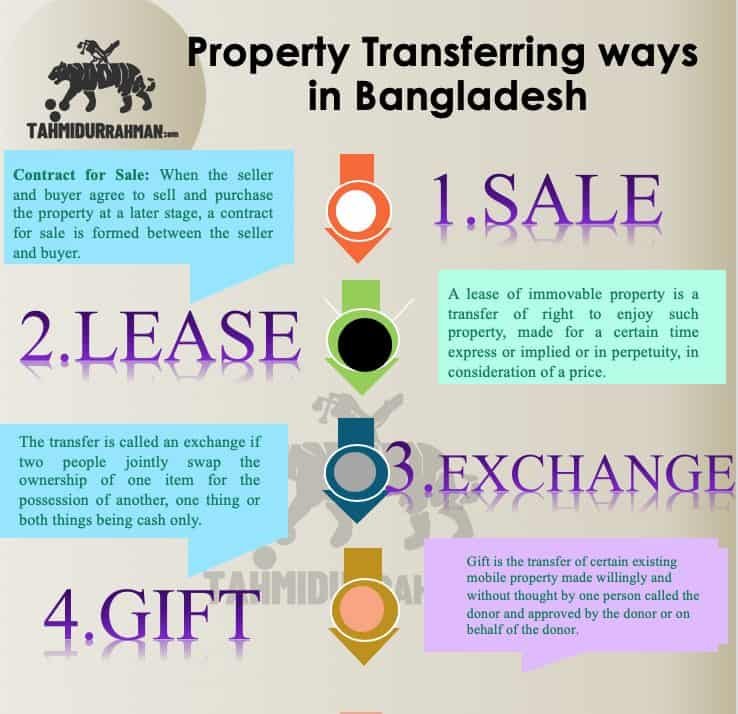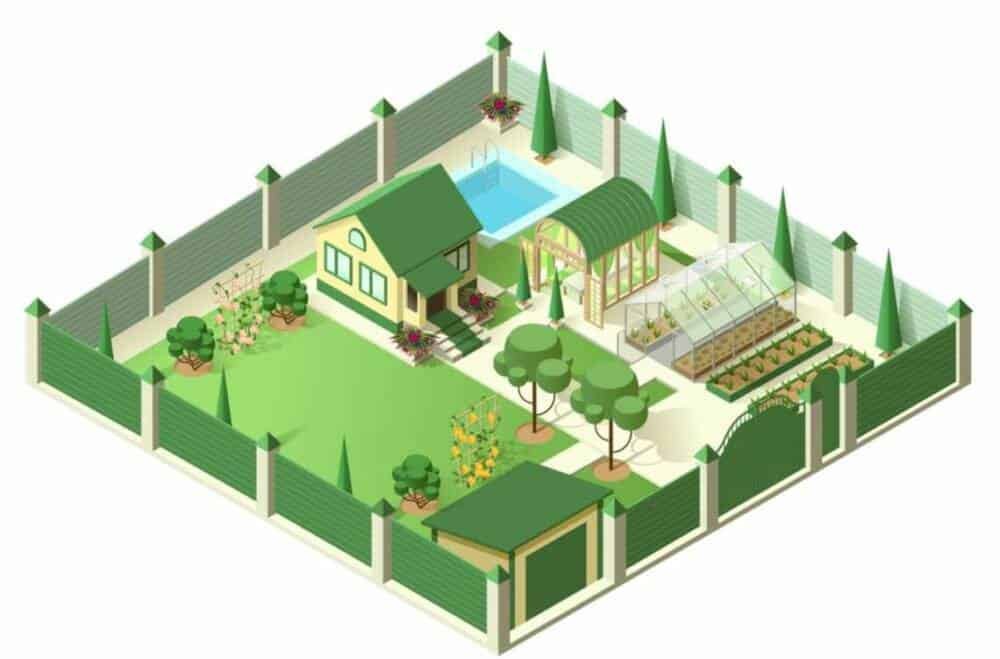Land Law in Bangladesh in 2024
This post in will explain in details the Land LAW IN BANGLADESH – Rules & Regulations, Everything about property law that you need to know and be aware of.
Types of Land in Bangladesh
At first let’s summarise the main forms of land properties or title to lands in Bangladesh. It is important to understand that the types of land classified below may co-exist so that there are several layers of tenure in relation to one parcel of land. For example, a person who has common law freehold may enter into a 3-year lease with a tenant, who may in turn lease a room to a sub- tenant.
A. Common Law Freehold:
Exclusive land ownership for an indefinite period of time. No PRIVATE INDIVIDUAL HAS THE RIGHT TO OWN MORE THAN 20 ACRES OF AGRICULTURAL LAND UNDER BANGLADESHI LAW. It is estimated that 69% of farm land ownership in BANGLADESH IS CURRENTLY COMMON LAW Freehold (as surveyed in 2005).
B. Permanent Lease/ Khas Lease
The right to use a government land plot for a term of 99-years at no expense varying from one to three acres. The Ministry of Lands grants landless persons (i.e. persons without freehold of common law) rights to use khas. Often this type of tenure is called a’ permanent lease.’
C. Leasehold
The right to use land or housing owned by another, also referred to as a money lease, for a fixed period in exchange for payment of rent. It is important to sign leases of more than one year. There is no need to provide one year or fewer leases in writing.
D. Sharecropping Agreement
Each shareholder and landowner receives one-third of the crop, and the remaining third is allocated on the basis of their contribution to crop costs. Sharecropper contracts must be legacy for at least five years.
E. Customary Ownership
Official government bodies and normal institutions share jurisdiction over property law in the Chittagong Hill Tracts. Nevertheless, customary law is applied in practice and institutions of government seldom interfere.
F. Co-operative Ownership
Cooperative ownership is a condominium-like ownership of an apartment. The purchaser holds stock shares in the building company and a rent or transfer of the apartment being sold by the seller’s contract in a collective ownership.
G. Tied Tenancy
Where a person occupies residential accommodation as an employee of a government agency or private organization, or as an agricultural land labourer.
H. Informal Tenure
There are many forms of unofficial tenure, which means tenure that does not meet the requirements for registration. It includes the following details.
• Leasing without a registered lease— a person who has a verbal AGREEMENT to occupy land or housing for a rent payment of more than one year or from year to year.
• Unregistered land ownership— a person owns land under circumstances but the land is not properly registered. For example, the land transfer was not registered to the current owner, or the current owner owns part of a subdivided block and the subdivision was not registered.
What are the main government and non-government bodies (eg, representative bodies) which administer the land law of Bangladesh rules and regulations or deal with housing, land and property?
The Lands Ministry, which has the following divisions, is the largest government agency responsible for land management, which governs the Land LAW IN BANGLADESH – Rules & Regulations, and Everything regarding property law.
• The Land Record & Survey Directorate is responsible for conducting land surveys and creating individual land registration certificates (khatian) and maps (mouza) for each parcel of land.
• The Land Reform Board is responsible for administering government land (i.e. khas), establishing and collecting land development tax, ENFORCING LAND REFORM LAWS and preparing modified property registration certificates.
• The Land Appeal Board is responsible for the determination of appeals against decisions of government officials on land issues, namely land taxes and land ownership and boundaries as reported in land registration certificates (khatians) and maps (mouza).10 In addition to the above, the Land Registration Department is responsible for the registration of land ownership changes arising from land recording. The LAND REGISTRATION OFFICE IS HOUSED WITHIN THE LAW, Justice and Parliamentary Affairs Ministry. This operates at district level by District Registrars and by Sub Registrars at Upazilla, i.e in Sub-District Level.

“TR Barristers in Bangladesh is Considered as one of the leading firms in Property Law in Dhaka, Bangladesh”
Carpe Noctem Bangladesh
LAND DOCUMENT & REGISTRATION PROCESS IN BANGLADESH
According to Bangladeshi law, the following forms of TRANSACTIONS are required to be registered: leases for more than one year or from year to year; freehold transactions relating to common law, such as transfers or subdivisions; and the granting of 99-year government land leases (khas).
In fact, informal conveyancing is extremely common as there are major issues with the system of land REGISTRATION IN BANGLADESH.We use the word ‘ informal conveyancing’ to refer to transactions that do not comply with the criteria for registration. The World Bank ranks Bangladesh 186th out of 190 countries for the speed, reliability and performance of its land registration processes.17 The shortcomings in the land registration PROCESS IN BANGLADESH are as follows:
• LAND REGISTRATION IS A COMPLICATED, TIME-CONSUMING AND COSTLY PROCESS:
For example, registering a transfer of freehold land in Dhaka will take about 245 days, require a payment of 10 percent of the purchase price and involve eight different procedures.These procedures are generally too difficult for lay people to follow without legal assistance, and too expensive for urban poor people. The cost of land registration is exacerbated by required speed moneys in government offices.
Inaccuracy in certificates:
The reliability of land registration certificates (khatian) and maps (mouza) is undermined by the fact that there are several government agencies involved in the process of land registration and poor coordination between them. At three different offices, ownership rights are registered:
o The Directorate of Land Record & Survey (DLRS) is responsible for conducting surveys of land, including preparing individual land record certificates (khatian) and maps (mouza);
o The Department of Land Registration (DLR) is responsible for registering land transfers and reporting these to the Land Reform Board; and
o The Land Reform Board (LRB) is responsible for manually preparing updated land record certificates.
How ‘TR Barristers in Bangladesh Associates’ helps the purchaser of any land in Bangladesh:
The purchaser often requires a comprehensive due diligence report on several complex issues involving authenticity, title, possession and land transfer history prior to acquisition, purchase of land or long-term lease for commercial purposes. ONLY A PHYSICAL SEARCH OF BOOKS AND RECORDS IN A NUMBER OF OFFICES CAN PROVIDE THE SAME, IN ADDITION TO PHYSICAL SURVEY IS OFTEN REQUIRED TO LOCATE AND MEASURE THE LAND. ONCE DUE DILIGENCE IS DONE, WHEN LAND / BUILDING / APARTMENT IS FOUND TO BE SATISFACTORY, THE PURCHASER ALSO NEEDS ASSISTANCE IN PREPARING THE DOCUMENTATION OF THE DEED OF AGREEMENT for Purchase (Baina); Sale Deed; Lease Agreement, etc. It’s a very complex matter to deal with land.
CLICK HERE TO MAIL US IF YOU HAVE ANY LEGAL QUERIES REGARDING THIS
OR CALL US ON : +8801847220062 OR +8801779127165

How to Transfer property in Bangladesh?
In Bangladesh, the transfer of property is GOVERNED by the Transfer of Property Act 1882, which essentially shapes the Land Law in Bangladesh & Rules and regulatations. In this act, “transfer of property” means an act by which a living person transmits property to one or more other living persons, or to himself, or to himself, or to one or more other living persons, in the present or future; and “transfer of property” means such an act. “Living PERSON” INCLUDES AN INDIVIDUAL CORPORATION or association or body.
There are four modes of property transfer given below: sale; lease; exchange; and inheritance and mortgage transfer of gift property.
SALE:
Sale is an ownership transfer in exchange for a price paid or promised or part paid or promised. Unless the price is determined, a sale is not complete.
Contract for Sale: If the seller and buyer agree to sell or buy the property at a later stage, the seller and buyer must enter into a contract for sale. A agreement establishes a contractual responsibility between the buyer and the seller, and a contract for sale does not change ownership of the property. A sales contract in the sub-registry should be registered.
LEASE:
The lease of immovable property is a transfer of the right to enjoy such property, made expressly or implied or in perpetuity for a certain period of time, in consideration of a price paid or promised, or in consideration of money, a share of crops, services or any other value.
EXCHANGE:
The trade is called an exchange if two people swap each other’s ownership of one item for the possession of another, one thing or both things being cash only.
GIFT:
Gift is the transfer of certain existing mobile property made voluntarily and without consideration by a person called the donor, to another PERSON CALLED THE DONOR AND ACCEPTED BY THE DONOR OR ON BEHALF OF HIM.

“The lease of immovable property is a transfer of the right to enjoy such property, made expressly or implied or in perpetuity for a certain period of time, in consideration of a price paid or promised, or in consideration of money, a share of crops, services or any other value.”
Land Registration in Bangladesh
REGISTRATION IS MANDATORY
Under the present LAWS OF BANGLADESH, the deed by which the property will be transferred is required to be registered with the relevant Sub Registry Office. Non registered document has no legal value and the any party will not be able to enforce his/her right if the deed is not registered.
RECORD OF RIGHTS
If the name of the transferor is not found in the latest Khatian or his/her name is not mutated, the Sub Registrar will refuse to register the transfer deed. Therefore it is mandatory to mutate the name of the transferor in the latest Khatian.

If you wish to know about the rquired steps to go through before buying any property in Bangladesh, go through the Article Below. This post deals with the questions like Why it’s important to verify the ownership of any property in Bangladesh? How to find the Ownership of a Land?
How to find the Ownership of a Land | Check the Legitimacy of Property you buy in BD
- Here we have described in details (nine steps), the procedure of verifying the property of any ownership of any properties in Bangladesh.
By choosing TRW Law Firm, clients can be confident that their land documents are in capable hands, backed by legal professionals who are dedicated to achieving the best possible outcomes.
GLOBAL OFFICES:
DHAKA: House 410, ROAD 29, Mohakhali DOHS
DUBAI: Rolex Building, L-12 Sheikh Zayed Road
LONDON: 1156, St Giles Avenue, Dagenham
Email Addresses:
INFO@TRFIRM.COM
INFO@TAHMIDUR.COM
INFO@TAHMIDURRAHMAN.COM
24/7 Contact Numbers, Even During Holidays:
+8801708000660
+8801847220062
+8801708080817



